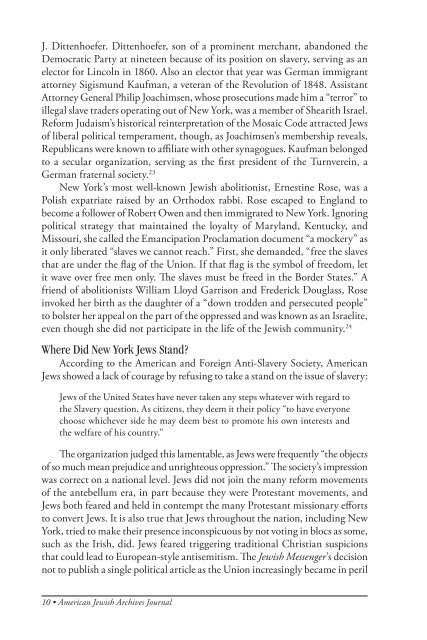American Jewish Archives Journal, Volume 64, Numbers 1 & 2
American Jewish Archives Journal, Volume 64, Numbers 1 & 2
American Jewish Archives Journal, Volume 64, Numbers 1 & 2
You also want an ePaper? Increase the reach of your titles
YUMPU automatically turns print PDFs into web optimized ePapers that Google loves.
J. Dittenhoefer. Dittenhoefer, son of a prominent merchant, abandoned the<br />
Democratic Party at nineteen because of its position on slavery, serving as an<br />
elector for Lincoln in 1860. Also an elector that year was German immigrant<br />
attorney Sigismund Kaufman, a veteran of the Revolution of 1848. Assistant<br />
Attorney General Philip Joachimsen, whose prosecutions made him a “terror” to<br />
illegal slave traders operating out of New York, was a member of Shearith Israel.<br />
Reform Judaism’s historical reinterpretation of the Mosaic Code attracted Jews<br />
of liberal political temperament, though, as Joachimsen’s membership reveals,<br />
Republicans were known to affiliate with other synagogues. Kaufman belonged<br />
to a secular organization, serving as the first president of the Turnverein, a<br />
German fraternal society. 23<br />
New York’s most well-known <strong>Jewish</strong> abolitionist, Ernestine Rose, was a<br />
Polish expatriate raised by an Orthodox rabbi. Rose escaped to England to<br />
become a follower of Robert Owen and then immigrated to New York. Ignoring<br />
political strategy that maintained the loyalty of Maryland, Kentucky, and<br />
Missouri, she called the Emancipation Proclamation document “a mockery” as<br />
it only liberated “slaves we cannot reach.” First, she demanded, “free the slaves<br />
that are under the flag of the Union. If that flag is the symbol of freedom, let<br />
it wave over free men only. The slaves must be freed in the Border States.” A<br />
friend of abolitionists William Lloyd Garrison and Frederick Douglass, Rose<br />
invoked her birth as the daughter of a “down trodden and persecuted people”<br />
to bolster her appeal on the part of the oppressed and was known as an Israelite,<br />
even though she did not participate in the life of the <strong>Jewish</strong> community. 24<br />
Where Did New York Jews Stand?<br />
According to the <strong>American</strong> and Foreign Anti-Slavery Society, <strong>American</strong><br />
Jews showed a lack of courage by refusing to take a stand on the issue of slavery:<br />
Jews of the United States have never taken any steps whatever with regard to<br />
the Slavery question. As citizens, they deem it their policy “to have everyone<br />
choose whichever side he may deem best to promote his own interests and<br />
the welfare of his country.”<br />
The organization judged this lamentable, as Jews were frequently “the objects<br />
of so much mean prejudice and unrighteous oppression.” The society’s impression<br />
was correct on a national level. Jews did not join the many reform movements<br />
of the antebellum era, in part because they were Protestant movements, and<br />
Jews both feared and held in contempt the many Protestant missionary efforts<br />
to convert Jews. It is also true that Jews throughout the nation, including New<br />
York, tried to make their presence inconspicuous by not voting in blocs as some,<br />
such as the Irish, did. Jews feared triggering traditional Christian suspicions<br />
that could lead to European-style antisemitism. The <strong>Jewish</strong> Messenger’s decision<br />
not to publish a single political article as the Union increasingly became in peril<br />
10 • <strong>American</strong> <strong>Jewish</strong> <strong>Archives</strong> <strong>Journal</strong>
















